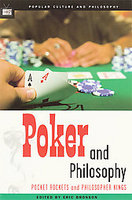
Poker and Philosophy
Poker and Philosophy Provides Thoughtful Collection of Essays
Open Court has published a twenty volume series (so far) where each volume associates some aspect of popular culture with the academic discipline of philosophy. Examples include Baseball and Philosophy, The Simpsons Nick Christenson is widely regarded as one of the best gambling book reviewers publishing today. He is a contributor for Poker Player magazine, and has published in Full-Tilt and Gambling Times. He is also the editor of the very funny 'Casino Death Watch,' which chronicles the comings and goings of casinos in Las Vegas. He is an avid poker and blackjack player. Nick's website is www.jetcafe.org/~npc/ and Philosophy, and even Buffy the Vampire Slayer and Philosophy. Given the recent rise in the popularity of poker and the litany of literature that deals with poker as a microcosm of life, Poker and Philosophy would seem to be a natural addition to this series.
Nick Christenson is widely regarded as one of the best gambling book reviewers publishing today. He is a contributor for Poker Player magazine, and has published in Full-Tilt and Gambling Times. He is also the editor of the very funny 'Casino Death Watch,' which chronicles the comings and goings of casinos in Las Vegas. He is an avid poker and blackjack player. Nick's website is www.jetcafe.org/~npc/ and Philosophy, and even Buffy the Vampire Slayer and Philosophy. Given the recent rise in the popularity of poker and the litany of literature that deals with poker as a microcosm of life, Poker and Philosophy would seem to be a natural addition to this series.
The book consists of 19 essays by strongly credentialed academics, most of whom have extensive publication records in the discipline of philosophy. Consequently, we get some thoughtful takes on various aspects of poker, including the ethics of bluffing, gambling and human nature, and gender issues in poker. These are all interesting topics that are well worth serious investigation. While the issues they address are thought provoking, the book is written in a very accessible style. It's not at all necessary to possess a masters degree in order to understand what these authors have to say.
At the same time, as academically strong as these essay authors may be, I can't find any indication that any of them have much in the way of poker credentials. Some of these essays do reveal some significant poker insight, but not as many of them as I'd like. The title of the book series is Popular Culture and Philosophy, and it is especially appropriate in this case, because as a rule these authors approach poker from a popular culture perspective.
What this means is that while these essays may appeal to those who enjoy the occasional home game or televised poker show, there's much less here for the serious poker student. While these authors are deep thinkers who have a great deal to say about human nature, as a whole their insight into poker is much less strong.
My favorite essay in the book was written by Willie Young. He successfully compares the teachings of Aristotle from his work, Nicomachean Ethics, with that of many poker authors. Both teach that the correct approach, whether it's to poker or life, is to focus on making correct decisions rather than on favorable outcomes that may be dependent on other factors. My opinion is that this particular essay is one of the few that communicated some true insight into the game of poker.
There were several essays where I thought the author demonstrated a fundamental misunderstanding of the game of poker, but if I were to single out the one that bothered me most, it would be the writing of Robert Northcott. His essay, "The Irrational Game: Why There's No Perfect System" discusses poker, strategy, and the mathematics of game theory. Unfortunately, I believe the author demonstrates a fundamental misunderstanding of the mathematics of game theory and as much as admits no knowledge of the significant poker research that has been performed in the last fifteen years.
Many readers of poker books are interested only in reading material that will directly improve their game. This isn't one of those books. Moreover, because the authors' grasp of philosophical topics greatly exceeds the depth of their poker knowledge, Poker and Philosophy will likely be of less interest to those who are most familiar with the game. However, some of the essays are at least interesting, although I expect the book will appeal more to those with a casual, "pop culture" understanding of poker. Those who don't find the idea of this book especially appealing will probably not come to regret passing it by.
